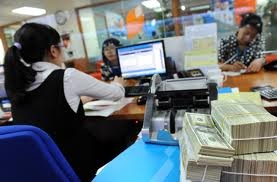State Bank needs to move with the times
 The State Bank, for example, has targeted credit growth at 12 per cent in 2013 compared to the 15-17 per cent projection in 2012. But Eximbank’s general director Dr. Truong Van Phuoc, however, suggests that the 12 per cent growth target should be looked at with flexibility, as some banks might outdo the target while others could not.
The State Bank, for example, has targeted credit growth at 12 per cent in 2013 compared to the 15-17 per cent projection in 2012. But Eximbank’s general director Dr. Truong Van Phuoc, however, suggests that the 12 per cent growth target should be looked at with flexibility, as some banks might outdo the target while others could not.
Phuoc had pegged perspective mobilising rates at banks in 2013 at 7-9 per cent and lending rates at 10-12 per cent, per year.
In the recent past, banks en masse announced their business statements in 2012’s fourth quarter and the whole 2012 with many banks incurring sharp declines in profits, largely due to banks’ huge loan loss provisioning.
Banks are now said to face the prospect that part of their loans, currently viewed as safe, may turn into bad debts unless the economy resumes growth as expected.
“If economy is slow to revive, this loan segment will incur big pressures and may drive up banks’ non-performing loans which would make banks cautious to lend out,” Phuoc explained.
HDBank deputy general director Le Thanh Trung said that although state policies to spur economic growth have become clearer, reining in inflation remains an arduous task. The effort, he said, could hinder the pace of credit growth while averting banks from quickly pulling down interest rates.
To seek a way out, financial experts assume that a comprehensive suite of measures would be crucial to stimulate the market’s aggregate demand and help firms unclog inventories and clear bad debts.
According to Dr. Tran Hoang Ngan, deputy rector of Ho Chi Minh City University of Economics, the government needs to present a group of short-term measures to quickly address current bottlenecks to facilitate circulation of goods and tackle inventories.
Ngan emphasised the need for money to flow to right addresses to prop up production and business. He also stressed the importance of state policy incentives for home buyers to kick up market demands through low interest rates and longer loan duration from 10-15 years.
The SBV reportedly contemplates pumping out VND100-150 trillion ($4.7-$7.1 billion) to tackle bad debt dilemma, particularly in the property sector, with commercial banks getting low-cost capital infusion from $950 million-$1.9 billion from central bank to boost house purchases.
Ngan stressed this low-cost credit must be directed properly to ensure repayment.
What the stars mean:
★ Poor ★ ★ Promising ★★★ Good ★★★★ Very good ★★★★★ Exceptional
 Tag:
Tag:
Related Contents
Latest News
More News
- Hoa Phat Agricultural Development debuts shares on HSX (February 06, 2026 | 14:00)
- Vietcap’s VAD 2026 draws strong global investor turnout (February 06, 2026 | 13:30)
- New rules ease foreign access to Vietnam equities (February 05, 2026 | 17:29)
- 0.1 per cent tax proposed on each transfer of digital assets (February 05, 2026 | 17:27)
- Ministry of Finance tightens policy delivery at start of year (February 05, 2026 | 17:26)
- Vietnam steps up market reforms as FTSE Russell reviews upgrade progress (February 05, 2026 | 17:20)
- 2025 profits mixed amid strong energy and farming results (February 05, 2026 | 17:18)
- Cashless payments hit 28 times GDP in 2025 (February 04, 2026 | 18:09)
- SSIAM and DBJ launch Japan Vietnam Capital Fund (February 04, 2026 | 15:57)
- Banks target stronger profits, credit growth in 2026 (February 04, 2026 | 15:43)





















 Mobile Version
Mobile Version